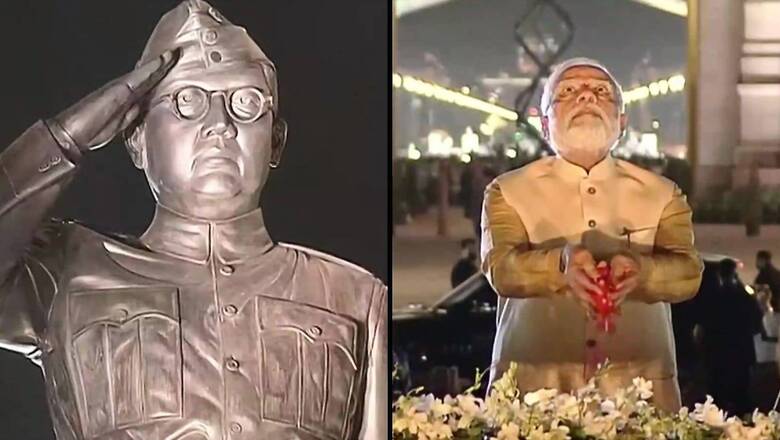
views
Prime Minister Narendra Modi inaugurating the Central Vista complex and unveiling Subhas Chandra Bose’s statue at India Gate represents a moment of great significance.
Parliamentarians with the duty of running the country will finally occupy a building complex suitable to their needs, the solemnity of their preoccupations and constructed by an independent vibrant India. Hopefully, its proceedings will exhibit a renewed decorum as well. Yet, it is not of the new Central Vista complex which is truly significant, important though it is as the nation’s new stately parliamentary complex. It is the installation of the statue of Subhas Chandra Bose in full military uniform at India Gate that is the momentous event.
The statue symbolises an ancient historic tradition of Kshatriya valour that had faltered under Mahatma Gandhi and Jawaharlal Nehru, despite the efforts of Subhas Chandra Bose in the 1940s, until its gradual restoration after India’s self-inflicted military setback of 1962.
Narendra Modi has delivered an emphatic re-statement of the India that is Bharat, repudiating a legacy of appeasement and defeatism. He has reanimated a nation with a fortified purposiveness, appropriate to the adversarial real world inhabited. The symbolic change in India’s naval ensign is also an imaginative reaffirmation of India’s historical achievements and identity during the reign of Chhatrapati Shivaji Maharaj. Of the many heroes of India’s independence movement, Veer Savarkar would have approved of these changes.
In the context above, it might be worthwhile to revisit and re-emphasise the historical and political backdrop in which such a rearmed Indian reprise is both necessary and justified. It would be especially appropriate to pose the option of India’s unavoidable future as a warfare state.
India is entering a historic phase of huge external military challenges that have combined with internal subversion, domestic power struggles and open separatism to endanger it. India is a regrettably complacent society and its incomprehensible insouciance in the face of the most severe challenges confounds. Yet, the nation is almost certainly destined to encounter serious threats to its very integrity as a sovereign polity. Its regional adversaries and frenemies will surely have concluded that within the decade, India will grow to become a much more formidable proposition to deal with and eliminate as a hindrance to their own ambitions.
By the next decade, India’s economic size and mere existence alone will constitute the well and truly intolerable proverbial fly in the ointment for China, by objectively and subjectively ending its reveries of total Indo-Pacific hegemony.
For Pakistan, such an economically empowered India will cease to be the potentially manageable rival with whom it could joust, parry and negotiate under the illusion of being formal equals. India will become an existential threat to it by virtue of Pakistan’s creation in the shape of an unviable artificial polity to serve British geopolitical interests, as a militarised cantonment in India’s northwest. Specifically, a flourishing India will also constitute dangerous secessionist incitement to Pakistan’s already rebellious provinces if not engage in actively assisting them.
Western nations who have long harboured dreams of resuming some sort of political control over India by turning it into a docile subordinate Christianised partner of the Anglosphere and Europe, through religious conversion that will rob India of its innate civilisational individuality, are also seeing the writing on the wall.
They rightly judge India will crack down firmly on the carte blanche evangelism was accorded by Jawaharlal Nehru and never really curtailed seriously by Indian governments subsequently. Such global evangelist forces have already unleashed a campaign of calumny and subversion against India, in response to the adoption of modest national policies to curb their nefarious activities across it.
In order for India to survive as a nation and civilization, there is an imperative need for its decision makers to reach a historically grounded and realistic assessment of their own predicament. The rule of law and democracy are necessary for any functioning society if only to ensure its citizens resolve inevitable disagreements among themselves peacefully through judicial means.
This is how the great French philosopher Charles-Louis de Secondat Montesquieu thought the existential propensity of Hobbesian war of ‘all against all’ in human societies could be mitigated if not avoided by constitutional means, which means parliamentary government and a separation of powers. To this, political philosopher and economist Adam Smith had added the brilliant insight that markets and the division of labour would bind people together through their need for each other to function as economic agents and live.
Yet, this somewhat idyllic picture of how the Hobbesian conundrum might be overcome is not the full actual historical experience. First, constitutional parliamentary government does not make a society permanently immune to a breakdown of order. Second, pertinent for India, is the more fundamental problem that the establishment of constitutional and parliamentary government occurs after the cessation of antecedent social disorder.
This occurs when a victor in the civil war is able to impose such a form of governance or exhausted parties in conflict agree to a truce and negotiate to create some more amicable modus operandi.
In India’s case, a Constitution was imposed from above with historic unresolved tensions and conflicts remaining intact despite Partition and egregious errors of judgment of Mahatma Gandhi and Jawaharlal Nehru at the time. Once relative domestic social peace and stability have been established, the polity still has to negotiate its place in a disorderly international order in which adversarial predatory relations between countries have always been the historical norm. Not for nothing was a Greek synonym for man soldier.
A counterintuitive depiction of the international system is one of permanent war or unending simmering conflict, with cessation of hostilities the temporary exceptional period. Yet, when the international realm is depicted in many standard accounts as a functioning ‘society’ as well it amounts to imputing something more to it than habitual hostility between its constituent members. In fact, this is a perfectly reasonable portrayal of countries belonging to an international society since they have also engaged with each other in a multiplicity of exchanges, from commerce to culture.
However, although peace and conflict have always co-existed in the world, it is the primacy of the latter over the former that has been demonstrated repeatedly. War and war-making unfailingly triumph over peace.
Britain’s successful blockade of German food imports during WWI, which is not widely known, was a key reason for Germany’s ultimate defeat. Very little needs to be said of the scale of economic warfare that accompanied military action itself during WWII with the loss of fuel supplies constituting a critical factor in the German retreat on the eastern front. The contemporary declaration of total war against Russia by NATO countries over its invasion of Ukraine includes a comprehensive commercial and financial boycott as well as blatant warfare through the media, as an aspect of the military campaign.
After more than 45 years as an IR student and scholar, it is my contention that many aspects of international relations, from the UN and its associated organisations and myriad dimensions of global interaction, are highly conditional. Much of what came into existence after WWII in the shape of international organisations was the product of the unique circumstances of Russo-American bi-polarity and US pre-eminence in the essentially Western-dominated UN and Bretton Woods system.
The UN system is the most prominent perceptual expression of an international society, apart from the European Union. Yet, the actual material impact of the former in comparison to private international commerce and finance is small. Its political import, articulated by great power coordination through the UN Security Council is minimal, which is either deadlocked at every juncture because of veto powers or by-passed by major powers.
However, the UN system is important for psychological reasons and that should not be underestimated and dismissed completely though it remains symbolic in the context of realpolitik. The European Union is a socioeconomic organisation but its creation was only made possible because of the political divisions of the Cold War. Member states constantly assert parochial national prerogatives against the wisdom of its international bureaucracy and exiting from the European Union is also an option, as the UK demonstrated.
The permanence and significance of national engagement through international organisations, in the shape of an ‘international society’, is not to be overrated since issues of political and power overwhelm them when they conflict. The permanence of war and its threat is the existential reality that reigns internationally, as it has done between political entities for millennia.
In the world of permanent conflict, India’s predicament is extraordinarily precarious because it poses a threat to others in its neighbourhood owing to its unfolding rise as an economic and military power at present. In anticipation of the likely attempt by adversaries to preempt India’s ascendance, it needs to mobilise as a warfare state. The rationale is prudential since a failure of India to defend itself will entail unprecedented catastrophe for its people.
In addition, other third parties may opportunistically seek to take advantage of its difficulties and a contingency plan is necessary to prepare for any such hostile action by them as well. As a result, India should mobilise its national material and manpower resources prodigiously in preparation for giving a befitting reply to any aggressors.
This is what the Soviet Union did to Nazi Germany, which could no longer entertain the idea of liquidating Russia within six months of the initial invasion and rapid advance into Russian territory, such was the damage Russian armies, though grievously battered themselves, inflicted on it. Most notably, the farsighted Joseph Stalin had begun preparing the USSR for total war 12 years before the German invasion in August 1941, when the desperate struggle for the very survival of the Slavic race began.
Indians have short memories and poor historical sensibility, but should recognise that the genocide of massive killings remains the norm in contemporary warfare, which the wars unleashed by the US on Iraq and Syria have highlighted and Pakistani troops wreaked on East Pakistan during 1971.
The next two decades will be of paramount importance for India, potentially facilitating consolidation of its hard worn progress since 1947 and especially 1991. For this, in addition to preparing for war, it needs international peace as well as domestic social stability and tranquility. But the key to its fate will depend on an admixture of sophisticated diplomacy to keep troubles at bay and buy time and military competence that threatens to impose unacceptably high costs on potential belligerents.
These two components of national diplomatic skill and military power, underpinned by an autonomous national economy. It also requires the additional quality of national unity and consensus in order to secure India’s well-being and that is apparently proving elusive. Its adversaries will surely exploit any diplomatic blunders India makes and real or perceived military vulnerability. Sleeper cells of Indian collaborators will also be activated to insert themselves into domestic fissures to accentuate them.
During the incumbency of Narendra Modi as prime minister, the government has delivered spectacularly on the diplomatic front and much of the credit does indeed go to him since he is personally driving the process and urging on his outstanding External Affairs Minister. The modernisation of India’s armed forces is also proceeding apace, though it is admittedly a slower process than the challenges posed demand.
India’s supposed friends and allies have not always extended help to India in urgent critical areas, like nuclear propelled submarines and ballistic missiles that would secure the third leg of its nuclear triad. The underlying motivation of countries selling advanced military hardware to India is mostly commercial and any real goodwill occupies a back seat. India is alone in a turbulent and hostile world and its people must strive to remain united if their injured civilisation is to repair itself, indeed survive.
Read all the Latest Opinion News and Breaking News here



















Comments
0 comment